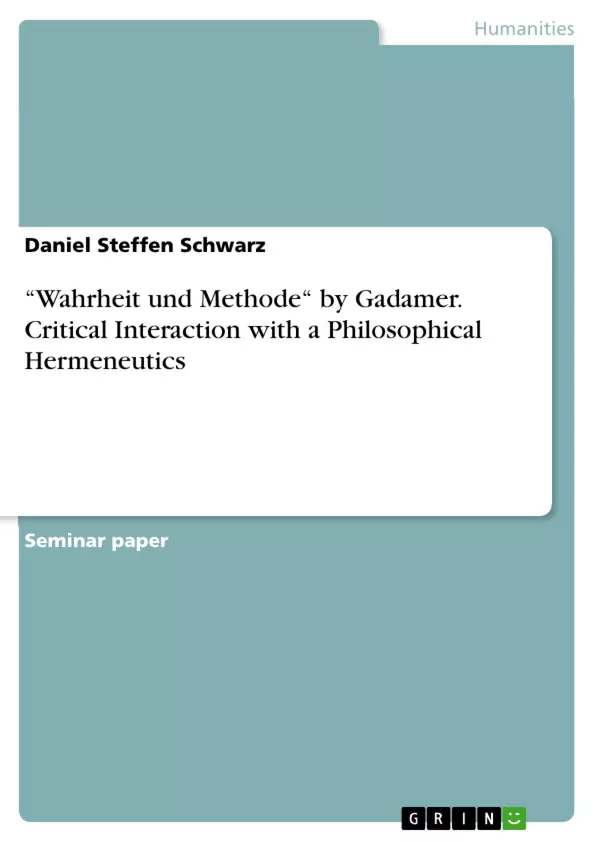What is truth? This question raised by Pilatus to Jesus does not only bother theological scholars ever since, but also philosophical thinkers. This paper examines how one of the most important German philosophers of the 20th century, Hans Georg Gadamer, dealt with the issue of truth within his hermeneutical main work “Wahrheit und Methode.” Even one of his critics, E.G. Hirsch admits: “Hans Georg Gadamer has published the most substantial treatise on hermeneutic theory that has come from Germany this century.” After the presentation of his main thesis, which can only be done in a rough overview, an evangelical response will be worked out. This main task of the paper will deal with the question how Gadamer´s ideas can be adopted in an apologetics within a postmodern framework. Aiming at a balanced evalutation both helpful and difficult aspects will be highlighted. A short conclusion bundling up the most important results will round of the paper.
Inhaltsverzeichnis (Table of Contents)
- Introduction
- Wahrheit und Methode: Main features of a philosophical hermeneutics
- Historical classification and def. "the truth of understanding"
- The problem of truth
- The truth of understanding
- Theoretical main features of Gadamer's hermeneutic
- The hermeneutical circle
- The prestructure of understanding: the prejudices
- The principle of the effective history
- The meaning of the application
- The practice of hermeneutics
- The hermeneutical experience
- Understanding as conversation in the dialectic of question and answer
- Critical Interaction with Gadamer
- Preliminary remarks
- Helpful ideas in Gadamers doctrine
- The claim for an own hermeneutical methodology for theology
- Applications of the hermeneutical circle
- The role of prejudices
- Implications from the call to effective historical consciousness
- The worth of the application
- Implications from the hermeneutical experience
- Hermeneutics as dialogue
- Human rationality as participating in transcendense
- Critical aspects
- Situatedness of the text and the noetical content of sense
- Context of words in hermeneutics?
- Text as communication partner?
- Going beyond the author's understanding?
- Between objectivism and relativism and theological hermeneutics
- The nature of truth within Gadamer's hermeneutics
- The role of prejudices in understanding
- The concept of effective history and its impact on interpretation
- The hermeneutical circle and its application to theological studies
- The potential and limitations of Gadamer's ideas for apologetics in a postmodern context
- Introduction: This chapter introduces the topic of truth and its significance in both philosophical and theological discourse. It presents Hans Georg Gadamer as a key figure in hermeneutics and outlines the main objectives of the paper, which is to examine Gadamer's approach to truth and its implications for apologetics.
- Wahrheit und Methode: Main features of a philosophical hermeneutics: This chapter dives into Gadamer's seminal work "Wahrheit und Methode," focusing on his critique of historicism and positivism. It examines Gadamer's concept of "the truth of understanding" and introduces key elements of his hermeneutics, including the hermeneutical circle, prejudices, and the principle of effective history.
- Critical Interaction with Gadamer: This chapter analyzes Gadamer's work from a critical perspective, highlighting both its strengths and weaknesses. It explores the potential applications of Gadamer's ideas to theology and apologetics, while also addressing potential challenges and limitations.
Zielsetzung und Themenschwerpunkte (Objectives and Key Themes)
This paper aims to examine how Hans Georg Gadamer, a prominent 20th century German philosopher, addressed the concept of truth within his hermeneutical work "Wahrheit und Methode." It explores the application of Gadamer's ideas to apologetics within a postmodern framework, highlighting both beneficial and challenging aspects. The paper seeks to achieve a balanced evaluation of Gadamer's work and its relevance to contemporary theological discussions.
Zusammenfassung der Kapitel (Chapter Summaries)
Schlüsselwörter (Keywords)
The paper focuses on the key concepts of truth, hermeneutics, interpretation, prejudices, effective history, Gadamer, apologetics, and postmodernism.
- Arbeit zitieren
- Daniel Steffen Schwarz (Autor:in), 2006, “Wahrheit und Methode“ by Gadamer. Critical Interaction with a Philosophical Hermeneutics, München, GRIN Verlag, https://www.hausarbeiten.de/document/284907


